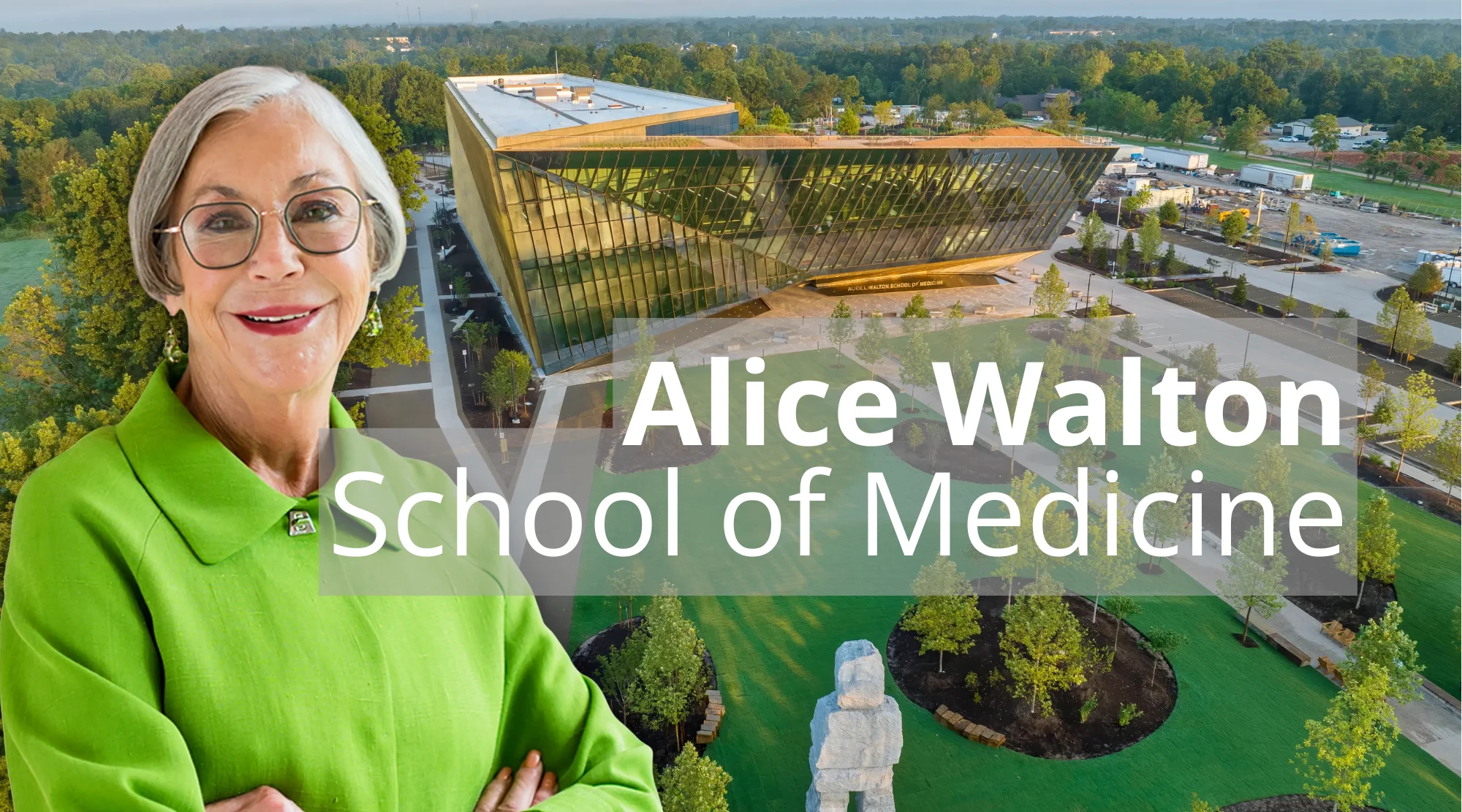The Future of Healthcare: Alice Walton’s Vision for Holistic Well-being
The world of medicine is undergoing a transformation, and at the forefront of this change is the Alice L. Walton School of Medicine (AWSOM). Founded by philanthropist Alice Walton, this groundbreaking institution is poised to revolutionize medical education by prioritizing a holistic approach to health. This article delves into the unique aspects of AWSOM, exploring its curriculum, mission, and the impact it aims to have on the future of healthcare. It is a beacon of hope for patients everywhere.

A New Approach to Medical Education: The Genesis of AWSOM
Alice Walton, heir to the Walmart fortune, established the AWSOM in Bentonville, Arkansas. The impetus for creating this innovative medical school stemmed from Walton’s personal experiences with the healthcare system. Her own health struggles and the shortcomings she observed in traditional medical practices fueled her desire to create a school that would equip physicians with the skills and knowledge to focus on patient well-being, not just the treatment of disease. The core philosophy is simple: healthcare should be about health and not just sick care.
The school’s mission is ambitious: to cultivate a new generation of physicians who are not only scientifically proficient but also deeply empathetic and committed to whole-person care. This encompasses physical, mental, social, emotional, and even socioeconomic aspects of health. The school’s approach is rooted in the belief that addressing the complete needs of the patient leads to better outcomes.
Integrating Art and Humanities: A Cornerstone of the Curriculum
A Holistic Curriculum for a Comprehensive Understanding of Health
AWSOM’s curriculum stands apart from conventional medical schools by integrating the study of medicine with elements of art and humanities. This innovative approach aims to enhance the doctor-patient relationship, fostering empathy and communication skills essential for effective healthcare delivery. The curriculum emphasizes the importance of self-care for medical professionals, recognizing that doctors who prioritize their own well-being are better equipped to care for others.
This emphasis on the humanities helps students develop a more profound understanding of the human condition, enabling them to connect with patients on a deeper level. The school’s approach promotes a collaborative environment, encouraging practices that focus on resilience, disease prevention, and overall health restoration.
The Whole Health Approach: Beyond Symptom Management
At the heart of AWSOM’s philosophy is the concept of “whole health.” This comprehensive approach recognizes that health encompasses multiple dimensions. The school promotes a model that considers the intricate interplay of physical, mental, social, emotional, and socioeconomic factors in a patient’s life. This perspective acknowledges that healthcare is not just about treating symptoms but about addressing the underlying causes of illness and promoting overall well-being.
This shift from a purely biomedical model to a whole-health model reflects a growing recognition of the limitations of traditional healthcare. Modern healthcare is recognizing the need to integrate factors like nutrition, exercise, and mindfulness into healthcare practices. Perhaps the best example of this shift in the healthcare landscape is the rising trend of luxury gyms and the rise of wellness. You can learn more in our article, “Luxury Gyms: Gen Z’s Fitness Revolution and the Rise of Wellness”
Addressing Health Disparities and Serving Underserved Communities
AWSOM’s Commitment to Community and Technology
A key focus of AWSOM is to train medical professionals dedicated to transforming healthcare in rural and underserved communities. The school aims to bridge gaps in access to care by employing contemporary technology and collaborative strategies. This commitment to community engagement is a crucial element of the school’s mission, reflecting a deep understanding of the importance of equitable healthcare access.
By prioritizing the needs of underserved populations, AWSOM strives to address systemic inequalities in healthcare. They hope to create doctors that understand the unique challenges these communities face, ensuring they are prepared to provide culturally sensitive and effective care.
The Role of Technology in Modern Healthcare
AWSOM recognizes the transformative power of technology in healthcare. The school integrates technological advancements into its curriculum, equipping students with the tools and knowledge necessary to leverage innovation for improved patient outcomes. This includes the use of electronic health records, telemedicine, and other technologies that enhance the delivery of care.
The integration of technology also includes a focus on data analytics, which allows physicians to identify trends and insights to create more personalized and effective treatment plans. This focus ensures that AWSOM graduates are well-prepared to navigate the evolving landscape of modern healthcare.
Empathetic Care and the Importance of Self-Care
Prioritizing Empathy and Emotional Intelligence
Empathy is a core value at AWSOM. The school strives to instill empathy in its students, recognizing that compassionate care is essential for building trust and establishing positive doctor-patient relationships. This approach emphasizes the importance of understanding a patient’s individual circumstances and concerns.
This emphasis on emotional intelligence extends to the doctors themselves. AWSOM recognizes that healthcare professionals face immense pressures and stresses. The school equips students with coping mechanisms and stress management techniques to ensure they can maintain their well-being while providing exceptional care.
Self-Care as a Foundation for Effective Healthcare
AWSOM promotes self-care as an integral part of the medical curriculum. They understand that healthcare professionals must take care of their own physical, mental, and emotional health to provide high-quality care. This emphasis on self-care not only benefits doctors but also improves patient outcomes.
By modeling healthy habits and prioritizing their own well-being, healthcare professionals can positively influence their patients. As you can see, this includes adopting things such as regular exercise. You can learn more about the power of walking in our article, “30-Minute Walking Workout: Maximize Calorie Burn and Boost Joint Mobility”.
The Future of Healthcare: A Vision for Wellness
Looking Ahead: The Impact of AWSOM on the Healthcare Landscape
The Alice L. Walton School of Medicine is not just another medical school; it is a bold vision for the future of healthcare. By focusing on holistic well-being, integrating the humanities, and emphasizing community engagement, AWSOM is poised to make a significant impact on the healthcare landscape. The school’s graduates are expected to be innovative leaders, equipped to provide exceptional care and advocate for patient-centered approaches.
The school’s success will depend on several factors, including its ability to attract and retain exceptional students, its commitment to innovative teaching methods, and its capacity to collaborate with other healthcare institutions and community organizations. If you are considering a career in healthcare, you are considering the future of healthcare.
Collaboration and Innovation: The Path Forward
The school’s success will hinge on collaboration. AWSOM is already working with local and regional healthcare providers, community organizations, and other institutions to ensure its curriculum is relevant and responsive to the needs of the community. This collaborative approach will enable the school to create practical learning experiences and to address health disparities in a targeted and effective manner.
AWSOM is also dedicated to fostering innovation in healthcare. The school encourages research and experimentation and provides opportunities for students to explore new technologies and approaches. This forward-thinking approach will help ensure that AWSOM graduates are at the forefront of medical advancements.
Addressing Mental Health and Well-being
As the article explores, a whole-person approach also embraces the importance of mental health. Mental health is an essential aspect of well-being. The AWSOM is making it a key aspect of their curriculum. The world of healthcare and medical education is starting to prioritize these concerns, as we can see in other areas such as the rise of AI therapy. For more information, you can learn about this new phenomenon and gain expert tips in our article, “AI Therapy: 5 Expert Tips to Protect Your Mental Health While Using Chatbots”.
The Ripple Effect: Transforming Communities and Beyond
The impact of the Alice L. Walton School of Medicine will likely extend far beyond the confines of its campus. By addressing health disparities, fostering innovation, and empowering its graduates to become empathetic and effective healthcare providers, AWSOM will contribute to healthier communities and a more equitable healthcare system for all.
The school will serve as a model for other medical schools, inspiring them to adopt innovative approaches to medical education. Walton’s vision is not just about creating a medical school; it is about transforming the future of healthcare.
Summary
The Alice L. Walton School of Medicine represents a significant step forward in medical education. Its commitment to a holistic approach, integration of humanities, and focus on community engagement will undoubtedly shape the future of healthcare. By prioritizing the well-being of both patients and healthcare professionals, AWSOM is setting a new standard for medical education. This approach will allow doctors to treat patients from all walks of life with understanding and create a healthier future for everyone. Are you ready to transform your healthcare journey? Start by understanding the importance of health and w














Post Comment